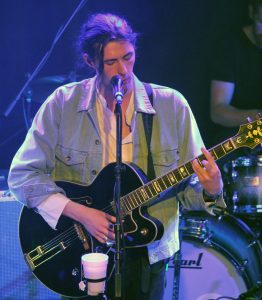MOORHEAD — Almost 10 years after his debut album, we can see Andrew Hozier-Byrne likes to take his time. The musical landscape since that debut has shifted in the advent of a post-Lorde pop world. I’ll be honest when I say I’m not terribly familiar with Hozier’s work. This is my first full-length album of his I’ll be listening to, outside of the occasional singles I’ve heard from him (such as the inescapable hit of Take Me to Church or the powerful, political soul of Nina Cried Power).
The dark balladry on Unreal Unearth could only exist in that post-Lorde space, but the eclecticism Hozier shows on this record makes it so much brighter, and eschews any pre-conceptions of his artistry being one-note, as Unreal Unearth is anything but. The tracks on this album weave between heart wrenching soul, 90’s indie rock, gospel, and folk styles. Hozier especially has an amazing understanding of soul and gospel and his vocal performances on the record match wonderfully.
The beginning of the album with De Selby (Part 1) sets the stage for the record with a sparse acoustic guitar, backed by strings and ambient electronics. The song also features Hozier’s first time speaking Irish on an album, coinciding with a dark pulsing synth bass before seguing into De Selby (Part 2), a ripping funk track with a distinct bassline. The track acts as Hozier’s best attempt at funk on the album. The underwhelming Eat Your Young in contrast has the stiffest drumming on the album. A clumsy hook, that when paired with the weak production ends up sounding like a poor attempt at hip hop and is the weakest of the more uptempo tracks on the record.
The key change on All Things End with the choir at the end makes it the most decadent and uplifting moment on the album. A truly defining moment on the record with the best chorus, great production and clarity and a great build that sticks in your mind after listening.

Songs like Who We Are showcase the great highs of Hozier-Byrne’s vocal range, and the richness of his lyricism and vocalizations. His vocals sound unprocessed which contrasts Francesca, which ends in a big swirl of vocal harmonies, with its Cranberries-inspired rock instrumentation.
Francesca happens to have the best build/crescendo on the album. It is the best execution of it as well as other tracks that feature it, namely Damage Gets Done with Brandi Carlile, end up feeling weaker by the end without a proper build. With that being said, the 80’s influenced style on Damage Gets Done is incredibly infectious, and the vocal chemistry between Carlile and Hozier keeps me coming back anyway.
The record itself ends weaker than it starts. Anything But is a generic folk-pop song, reminiscent of the oversaturated early 2010’s folk revival (think The Lumineers or Mumford & Sons), and tracks like the closer First Light or even Abstract (Psychopomp) feel overblown as their runtime extends. Butchered Tongue is a track with a beautiful string arrangement underneath Hozier’s vocals but doesn’t have the runtime to properly capitalize on the ideas presented. An ending with no fanfare.
My overarching problem with this last portion of the record is that the ideas just don’t feel developed enough. The songs are too short to really carry enough emotional weight, or too long, making them a slog to get through.
In an interview reflecting on the success of Take Me to Church, Hozier described the continued love for that song, despite how many times he’s had to perform it and hear it. He still resonates with that message. Unreal Unearth is not worried about replicating that success, but rather building the artistry Hozier-Byrne has up to this point. He is a risk taker (some of his risks pay off and some don’t). To me this shows how much growth he’s exhibited in the past 10 years, and will continue to show in the next.

